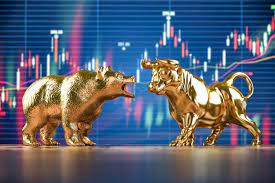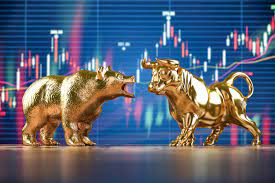
According to a Bank of America study released on Tuesday, investors around the world are more confident than they have been in the past two years this month and no longer anticipate a recession.
According to the research, fund managers with a combined $568 billion in assets reduced cash to 4.2% from 4.8% and increased allocations to international stocks to a two-year high.
According to the survey, money managers have abandoned their predictions of a recession for the first time since April 2022.
"Expectations for strong macro and no recession keep investors in the "soft landing" camp at 65%, with "hard landing" probability fading to just 11%," BofA said.
The "no landing" scenario is the category that is expanding the fastest. 19% of respondents, up from 7% in January, said they now expected the economy to crash.
Of them, 65% expect a soft landing and 11% a severe landing for the economy. 79% of respondents last month expected a soft landing or no touchdown at all, while 17% advocated for a harsh landing.
The main central banks are expected to slash interest rates multiple times this year, according to market prices. Some of this optimism has been refuted by the Federal Reserve, and recent data does not support immediate cutbacks either.
Nonetheless, this month's record highs above 5,000 for the S&P 500 were achieved thanks to positive sentiment surrounding AI and a strong earnings season.
Without a doubt, investors have fully committed to technology equities. The study indicates that the amount of money allocated to technology is at its highest level since August 2020, and fund managers think that the most crowded trade at the moment is "long Magnificent 7," which is a notional basket of the seven largest U.S. businesses by market value, which includes Apple and Microsoft.
"Short China stocks" is ranked second on the list. When Chinese blue-chip stocks fell to their lowest point in five years in February, Beijing's officials moved to stabilise the market and stop the exodus.
BofA's "Bull & Bear Indicator" has hit 6.8, according to the poll, which indicates that "investor positioning increasingly a headwind for risk assets," according to the bank.
(Source:www.zeebiz.com)
According to the research, fund managers with a combined $568 billion in assets reduced cash to 4.2% from 4.8% and increased allocations to international stocks to a two-year high.
According to the survey, money managers have abandoned their predictions of a recession for the first time since April 2022.
"Expectations for strong macro and no recession keep investors in the "soft landing" camp at 65%, with "hard landing" probability fading to just 11%," BofA said.
The "no landing" scenario is the category that is expanding the fastest. 19% of respondents, up from 7% in January, said they now expected the economy to crash.
Of them, 65% expect a soft landing and 11% a severe landing for the economy. 79% of respondents last month expected a soft landing or no touchdown at all, while 17% advocated for a harsh landing.
The main central banks are expected to slash interest rates multiple times this year, according to market prices. Some of this optimism has been refuted by the Federal Reserve, and recent data does not support immediate cutbacks either.
Nonetheless, this month's record highs above 5,000 for the S&P 500 were achieved thanks to positive sentiment surrounding AI and a strong earnings season.
Without a doubt, investors have fully committed to technology equities. The study indicates that the amount of money allocated to technology is at its highest level since August 2020, and fund managers think that the most crowded trade at the moment is "long Magnificent 7," which is a notional basket of the seven largest U.S. businesses by market value, which includes Apple and Microsoft.
"Short China stocks" is ranked second on the list. When Chinese blue-chip stocks fell to their lowest point in five years in February, Beijing's officials moved to stabilise the market and stop the exodus.
BofA's "Bull & Bear Indicator" has hit 6.8, according to the poll, which indicates that "investor positioning increasingly a headwind for risk assets," according to the bank.
(Source:www.zeebiz.com)





